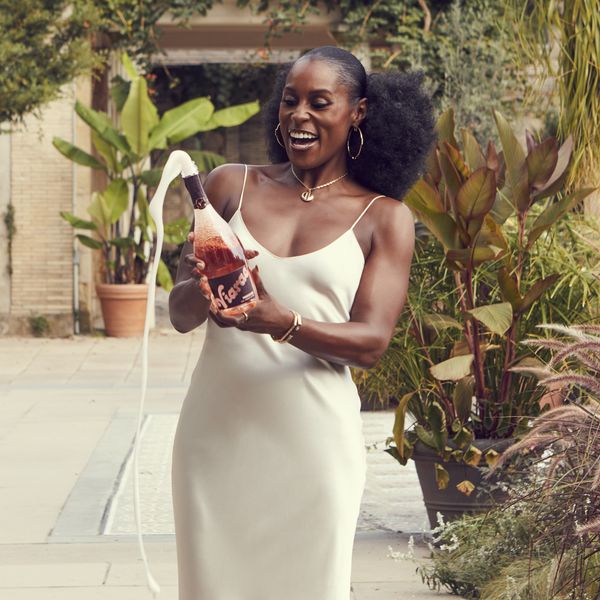
This is the kind of health and wellness article that I especially enjoy writing. The reason why is because, every time a big food trend comes out and/or folks watch some documentary and then vow to never eat a certain food again, I'm usually over here like, "Calm down. No need to be so extreme about everything. Moderation has always been the key".
And so today, we're gonna tackle eight foods that usually are the object of "don't do that" trends and docs. Should you consume them all of the time? As you're about to see in my breakdowns, absolutely not. At the same time, do they have absolutely no redeeming qualities at all? Yeah, that's not the truth either.
So, let's get into some foods that may be considered to be unhealthy, yet can actually benefit you, so long as you know what approach to take to them. Ready?
1. Beer
In order to break all of this down, as thoroughly as possible, it only makes sense to first explain why certain foods are considered to be unhealthy and then follow that up with the actual benefits that come with them. Let's start with beer. It's basically a fermented drink that is made from water, grain, hops and yeast (so if you've got an allergy to any of these things, it would automatically be a no-no for you). Since everything but the water in beer is a carb and carbs turn into sugar in our system, you can probably already guess that beer is a beverage that can help you to pack on the pounds (which is basically where "beer bellies" come from), if you're not careful. Also, consuming too much alcohol can lead to health issues like cirrhosis, hypertension and even breast and colon cancer.
Still, in moderation, beer can actually be a beneficial thing. The hops in it can help to reduce body inflammation; there are extracts in beer that can help to decrease tooth decay; there are also studies citing that moderate alcohol consumption (which includes beer) can reduce the risk for heart disease by as much as 42 percent, and since beer also contains the chemical element silicon, it can be great for increasing bone density and boosting your brain power too.
2. Bread
I know some people who act like bread is the devil. Here's why. Bread, especially white bread, tends to be high in carbs, low in micronutrients and made from sugar and gluten (which we'll get into a bit later). Plus, a lot of breads are made with refined flour which is the kind that has the bran pulled out of it. When you eat this type of bread, it can lead to obesity, heart disease and diabetes.
However, there are breads that are made from sprouted grains which is a good thing. That's because sprouted grains are a good source of protein, fiber, folate and Vitamin C. As a bonus, they're also much easier for your body to digest. If sprouted bread (like Ezekiel Bread) is a bit too "much" for you (it does tend to be a little on the hard side), sourdough contains prebiotics and is low on the sugar level side; 100 percent whole wheat bread leaves all of the grain intact and, flax bread has whole-grain flours and flax seeds which makes it one of the healthiest breads you can eat. Or, if you want to take a stab at making some of your own bread, click here for a recipe for soft whole wheat bread.
3. Hot Wings
I'm pretty much the kind of person who is gonna tear some chicken wings up regardless. But if you were ever wondering why some folks frown on this particular food, it's because, not only are (most) wings pretty much only comprised of skin and fat, the really good-tasting ones are usually fried. In fact, I once read somewhere that one wing can be anywhere between 165 and 200 calories. Then, if you add the ranch or blue cheese dressing into the mix, you're getting about 700 calories more (for five tablespoons).
So, what could possibly be the good side of 'em? It's actually the chicken itself. Chicken contains Vitamin B12 and choline which can help your nervous system to function properly. Chicken also has the amino acid tryptophan in it which makes it easier for your serotonin levels to stay in balance so that you can remain in a calm and relaxed mood. Chicken is also an awesome source of protein and we all need that for healthy hair and nails, to build muscle mass, and to keep building up our cells, bones, and what comprises our skin. Bottom line, if you want to keep a lot of the calories at bay, baking your wings instead of frying them is gonna be your best bet.
4. Cereal
If cereal is your favorite breakfast food, I get why you might want to skip over this particular point yet try and bear with me, OK? The main reason why breakfast cereal is so problematic is a lot of brands are loaded with sugar, preservatives and refined carbs (which are basically carbohydrates that have been stripped of all their nutrients). One way to know if yours falls into this category is to check out the label. If you see that sugar is the second or third ingredient, it's got way more than what you need. Plus, a lot of breakfast cereals are also highly processed which is never a good thing.
So, what possibly could be good about breakfast cereal? Well, if you look for the kind that are high in fiber and low in sugar, you can still enjoy the convenience of eating cereal without compromising your health in the process. If you're curious to know what some of those brands are, Good Housekeeping did an article featuring 30 of 'em. You can check that out here.
5. Juice
Before getting into this one, it's important to put on record that eating a piece of fruit is so much better for you than drinking fruit juice. The main reason why is because when fruit is in its purest form, it's got the skin as well as the pulp which gives you unprocessed nutrients and fiber. That said, drinking juice can sometimes be an issue because it is a source of sugar and, based on how it's made, the sugar amount can be a lot. Just think about it—if you read the back of a label of your favorite juice brand, oftentimes the caloric intake is as much as 120-170 calories per serving. This means that you could easily consume all of the calories you need a day (which is roughly somewhere between 1600-2400 for us) by drinking a few glasses of juice alone! That's why moderation is key. Also, you should avoid juice cocktail (that is definitely full of sugar) or pasteurized juices; those typically have compromised nutritional content in them. I've also read that juice that has the label "not from concentrate" isn't a good look because those are oftentimes stored in tanks that don't contain much oxygen; as a direct result, the flavor and quality isn't all that great.
Still, if you're intentional about purchasing 100 percent juice, a cup of it will roughly equate to one serving of fresh fruit. And since fruit contains antioxidants, fiber, potassium and folate (for starters), it's not a bad thing to drink juice. It's all about selecting the right quality and not drinking it like it's water. 2-3 glasses a day is more than plenty.
6. Red Meat
Something else that some people loathe is red meat. I absolutely am not one of them. Anyway, the reason why it tends to be a very controversial topic is because of how some cows are treated (that's a fair point) and also because a lot of meat is processed improperly which leads to consuming hormones and preservatives. Plus, the fat that oftentimes comes with red meat can increase your chances of diabetes, heart disease, and certain cancers (mostly colorectal cancer although it's actually a pretty low chance).
Why doesn't any of this absolutely terrify me? It's because I also know that red meat is high in protein, B-vitamins, iron, zinc, and selenium. As with just about everything on this list, the key is not to eat it all day, every day. Consuming a leaner cut, eating it no more than three times a week, and baking, steaming, or stewing it as much as possible helps you to get more benefits from red meat while lowering your chances of experiencing any health risks in the process.
7. Cocktails
Do you enjoy a nice cocktail at the end of the day? Aside from what I shared about alcohol in the beer section, the main things to keep in mind is alcoholic drinks tend to be high in calories and drinking too much can sho 'nuf turn you into an alcoholic. But if you're someone who only has one a day (or even better, 3-4 of 'em a week), for the most part, you should be fine (check out "Liquors That Are Gluten-Free (& Beneficial In Other Ways)"). Alcohol can boost your libido, make you less susceptible to colds and can even lower your risk of being diagnosed with Alzheimer's disease up the pike too. I've even read that 1-2 a day can lower the risk of death by as much as 18 percent. Sounds like a good reason to have margarita or mojito to me.
8. Gluten
I'm pretty sure that a lot of y'all remember how going gluten-free was all the rage a few years back. If you've ever wondered what exactly gluten is, the best way to probably describe it is, it's a group of seed storage proteins; although, to be fair, it is mostly comprised of wheat protein. The reason why some doctors and nutritionists frown at gluten is because, clearly, if you have a wheat allergy of some sort, consuming it is only going to make your symptoms worse. Not only that but, if you've been diagnosed with the autoimmune disorder celiac disease, gluten can actually cause your immune system to attack your small intestine. Also, people with a form of celiac disease known as dermatitis herpetiformis (DH) should stay away from gluten because it can attack their skin rather than their small intestine.
But what if you don't have any of these issues? Well, because gluten falls into the carbs category and carbs (good carbs, that is) make up 50-60 percent of our diet, that is one reason to not go totally without it. Also, if you've heard someone say that gluten can cause you to pack on the pounds, that's a myth. In fact, oftentimes it's the gluten-free brands that have more calories (due to more "filler sugar" that's added) than the ones that contain gluten. And finally, while gluten itself isn't something that's loaded with nutrients, because gluten is usually found in foods like whole grains (which are packed with vitamins and minerals), the focus needs to be more on if the food that contains gluten is good for you; gluten being in it is really not that big of a deal.
Welp. I hope that debunked certain myths that you've heard. Listen, 2020 showed all the way out so, if you wanna have a beer and some chicken wings every once in a while—do it. It's not as bad as you might've thought it was. Sis, you're totally welcome.
Join our xoTribe, an exclusive community dedicated to YOU and your stories and all things xoNecole. Be a part of a growing community of women from all over the world who come together to uplift, inspire, and inform each other on all things related to the glow up.
Featured image by Shutterstock
- What Exactly Does Intuitive Eating Mean? - xoNecole: Women's ... ›
- I Tried A 14-Day Water Fast - xoNecole: Women's Interest, Love ... ›
- I Tried It: Alkaline Water-Only Diet - xoNecole: Women's Interest ... ›
- Vaginal Health, Diet Changes pH Balance - xoNecole: Women's ... ›
- 10 Breakfast Foods That Are Bad For Your Health - xoNecole ... ›
- Alzheimer's Disease: Symptoms, Causes, Signs, Prevention - xoNecole: Lifestyle, Culture, Love, Wellness ›
Your December 2025 Monthly Horoscopes Are All About Surrender & Alignment
December is about letting go. We end the year with the need for more peace, reflection, and rejuvenation, and that is exactly what December is providing for us. The Sun is in Sagittarius, and anything is possible. This is the month to believe in that and to know that the universe is supporting you. With a Supermoon in Gemini as we begin the month as well, we have an opportunity to gain the closure we have been looking for this year and to wrap up old projects, ideas, and communication breakthroughs.
This is the month to make your peace the priority and let go of trying to control the way the tides are turning. Trust in your new beginning, and give yourself time to prepare for it this month.
A big part of the clarity that is coming through this month is due to Neptune going direct in Pisces on December 10, after being retrograde here since July. With Neptune now direct, we are able to see our inspiration and creativity a little more clearly, providing the perfect energy for dreams and manifestation to be built upon. The smoke is clearing, and it’s up to you to decide what you want to do with this newfound clarity that this transit is bringing. Mercury also moves back into Sagittarius on December 11, which is great for communication and clarity, and the adventures you were trying to see through at the beginning of November come around for you again with greater purpose and support.
On December 15, Mars enters Capricorn until the end of January 2026, and this is the extra push we need to make important changes and to be on the path towards greater abundance, stability, and prosperity. Mars in Capricorn takes care of business, and we have extra energy at our disposal during this time to do so. This transit is an ideal time to focus on your career or financial goals for next year and to start putting some of these plans into motion now. A few days later, we have the New Moon of the month, which will be in Sagittarius on December 19, and this is the perfect New Moon to manifest.
The energy is high, magic is in the air, and it’s all about moving forward with the new beginnings that are inspiring you and bringing you joy to think about right now.
Capricorn Season officially begins on December 21, and this earth sign energy is how we heal, gain closure, and build new foundations in our world. With Venus also moving into a Capricorn a few days later, there is something about peace, prosperity, and security that we are gaining in life and in love as we close out the year, and this is what we need right now. This month is about reflecting on what was, letting go of old hurt, and renewing. December is an ending and a new beginning in one, and there is magic in this space to be created.
Read for your sun and rising sign below to see what December 2025 has in store for you.
 AriesKyra Jay for xoNecole
AriesKyra Jay for xoNecoleARIES
December is a full-circle moment for you, Aries. You are seeing the gifts in your world and have a lot of gratitude for the way things have come about for you as of late. There are culminations in your world that are providing you with more abundance, stability, and community, and you are exactly where you are meant to be this month. With the Sun in a fellow fire sign and in your 9th house of travel for most of the month, December is a good time to get out of your comfort zone, explore the world around you, and get your body moving.
Mars, your ruling planet, also makes a change and moves into Capricorn on December 15, which will fuel your inspiration and power in your career space. You are making a lot of professional progress as we close out the year; however, make sure to be more mindful of your competitive drive right now. The New Moon on December 19 is the perfect opportunity for you to create some new plans and goals when it comes to traveling, education, and where you want to gain some new inspiration in your world. Overall, this is a month of things coming together for you serendipitously.
 TaurusKyra Jay for xoNecole
TaurusKyra Jay for xoNecoleTAURUS
December is about trusting your intuition, Taurus. You have a lot on your mind this month, and it’s best to delegate, communicate, and allow yourself some relief by opening up to someone and not feeling like you have to hold everything in. As we begin the month, we have a Supermoon in Gemini happening in your house of income, and the plans and projects you have been building here come to fruition for you now. This is the time to gain clarity on your financial world and to take a look at what spending habits you want to let go of here as well.
With Venus in your 8th house of shared resources for most of the month, you are doing a cleanse on your commitments, partnerships, and business ventures. You are taking a look at what you want to dedicate yourself to in the future, and what commitments you may need to let go of now in order to be in the space you truly want to be, both financially and within some of your relationship dynamics. Before we end the month, we have a New Moon in this same area of your chart, and it’s time to look at the opportunities that are presenting themselves and to trust your internal guidance system to lead you forward.
 GeminiKyra Jay for xoNecole
GeminiKyra Jay for xoNecoleGEMINI
You are moving forward fearlessly this month, Gemini. December is your month of love, passion, and dignity, and you are owning the light that you shine. We begin the month with the last Supermoon of the year, happening in your sign, and you are stepping up to the plate. You are showing up, owning how much you have grown this year, and allowing yourself to heal while also acknowledging that you have done your best and you deserve to have fun in the midst of the changes you are creating.
Mercury, your ruling planet, is officially out of retrograde, and you can use this energy to the fullest potential now. With Mercury in your 7th house of love, it’s time to speak from the heart and to talk about the things that matter and that are inspiring you right now to your loved ones. You never know what kind of epiphanies you may have when you open up the conversation to others. Before the month ends, you have a New Moon in this same love area of your chart, and this New Moon is all about manifesting romance, commitment, and abundance in your world.
 CancerKyra Jay for xoNecole
CancerKyra Jay for xoNecoleCANCER
December is an opening for more love, more joy, and more freedom in your life, Cancer. You have come to a place where you hold so much gratitude in your heart for where you are today and where your heart is shining, and things come together for you with more ease right now. With the Sun in your 6th house of health, work, and daily routines for most of the month, you are getting your ducks in a row while also putting more energy and effort into taking care of yourself, your priorities, and your well-being. This month surprises you in many ways, and it’s because you are showing up.
Mars and Venus both move into your house of love, relationships, marriage, and abundance this month, and you are making strides in your love life. You have both of these opposing forces on your side and are being recognized for the love you are while also receiving the love you want. This month, overall, is about focusing more on the positives in your world and letting your heart have its joy. Before December comes to an end, there is a New Moon in Sagittarius, and this is the perfect opportunity to create the plans you want to see through next year, especially when it comes to your work life, colleagues, business ventures, and health.
 LeoKyra Jay for xoNecole
LeoKyra Jay for xoNecoleLEO
The scales of karma are balancing, and they are balancing in your favor this month, Leo. December is your month of truth, and of seeing it clearly in your world. The Sun is in your house of romance, pleasure, and happiness for most of the month, and it’s time to relax, be in the present moment, and allow what is meant to be, to be. With a Supermoon in your 11th house of manifestation as December begins, this is a powerful month for seeing your dreams come to fruition, and for feeling like the intentions you have set this year are finally here for you now.
Mars also moves into your 6th house mid-month, and this is the perfect energy to have to move into the new year. You have extra energy at your disposal right now and are feeling fearless with what is possible for you and your daily routine. Before the month ends, we also have a New Moon in a fellow fire sign, Sagittarius, and this is a breakthrough moment for you and your heart. December, overall, wants to show you how loved and supported you are and will be doing so in magical, unexpected, and concrete ways.
 VirgoKyra Jay for xoNecole
VirgoKyra Jay for xoNecoleVIRGO
December is a month of victory, Virgo. You are showing up and experiencing some new successes in your world that move you forward on your path in life. With a Supermoon in your 10th house of career as we begin the month, the effort and intentions you have made this year come into full bloom, and you are being recognized for who you are and the good work you have done. This month is all about showing up and allowing yourself to be seen and loved, knowing that you deserve the support and opportunities you are receiving.
Mars moves into Capricorn on December 15, which brings the passion and excitement into your love life, hobbies, and little pleasures in life that light you up. You want to have fun this month and are going to be walking into the new year with this fearless, happy, and spontaneous energy within you. Before the month ends, Venus also enters Capricorn, and in this same area of your chart, you have a lot to look forward to and believe in right now. Overall, December wants you to be happy and will be doing everything possible to make that happen for you. This is your month to shine, Virgo.
 LibraKyra Jay for xoNecole
LibraKyra Jay for xoNecoleLIBRA
December is a month of opportunity for you, Libra. New doors open, and you are financially making breakthroughs this month because of it. December begins with a Supermoon in your 9th house, and you are getting a clearer view of where you have been making strides in your life and how it has all brought you here to this present moment of freedom. This month is showing you what happens when you are fearless with your purpose and when you believe in yourself and what you are worthy of.
Moving further into December, Mars moves into your 4th house of home and family mid-month, and you are closing out the year in your safe spaces. You are spending more time with your loved ones and taking the time to quiet your mind and listen to what your heart has been telling you. Before the month ends, we have a New Moon in Sagittarius, happening in an area of your life that deals with communication. This is a great time for getting the answers you have been looking for and for feeling more clear-headed and confident about the decisions you are making as you move into the new year.
 ScorpioKyra Jay for xoNecole
ScorpioKyra Jay for xoNecoleSCORPIO
Patience is a virtue this month, Scorpio. December is all about remaining patient and vigilant with what you are creating in your world, and knowing that the universe has your back. It’s time to be reminded of the power of hope, and this month is an opening to greater clarity in your life. There is a lot of energy in your financial zones right now, and this is providing you with new opportunities and new insight; however, the speed at which things come about for you may feel daunting. Keep your head up and eyes focused on what you want and know that you are more than worthy of receiving it.
With Mercury in your 2nd house of income this month, December is a good time to plant new seeds and to think about where you want to be financially a month from now or even a year. This month is asking you to think bigger and to think more long-term so that you can set the appropriate plans into motion now. We also have a New Moon in your house of income before the month ends, and this is when you will see more of your dreams come to fruition in this area of your life, and have more opportunities to build. Overall, December will be teaching you a lot, Scorpio.
 SagittariusKyra Jay for xoNecole
SagittariusKyra Jay for xoNecoleSAGITTARIUS
Sagittarius Season is here, and there is a lot in store for you this month, Sag. December is all about what you are dedicating yourself to. It’s about setting your intentions and putting the work in to back up your dreams, and about getting things in order so that when the new beginnings come, you are ready for them. The Sun and Venus are in your sign for most of this month, and there are a lot of eyes on you right now. You have the potential to create a new beginning for yourself, and it’s time to invest in yourself, your love life, and your dreams.
Mercury moves into Sagittarius on December 11, and this is giving you another opportunity to see through some of the plans that you had initiated in November. Mercury was retrograde in your sign last month, and there may have been some disruptions to your vision and plans for the future, and now this energy is turning around for you. Before the month ends, we also have a New Moon in Sagittarius, and you are walking through new doors fearlessly. You are catching others by surprise by your growth this month, and you are thinking a lot about your purpose, future, and plans for the new year.
 CapricornKyra Jay for xoNecole
CapricornKyra Jay for xoNecoleCAPRICORN
December is all about the vision, Capricorn. You are moving through a lot of changes and transformations this month, yet they are giving you a chance at a new beginning in the process. You are focused more on the future and what goals you want to manifest for yourself right now, and are ready to let go of what hasn’t been working for you. With the Sun in your 12th house of closure for most of December, this is your time for healing, but remember, healing doesn’t have to be isolating or boring; you can thrive while you renew, and you are this month.
Mid-month, the excitement picks up for you, and you are feeling more energized than you have in a while. Mars moves into Capricorn until the end of January 2026, and you are being proactive with your goals, intentions, and passions. You are a force to be reckoned with this month, and you are making things happen for yourself with confidence. Capricorn Season officially begins on December 21 this year, and this is definitely speeding up your healing process. You are breaking free from what was, and with Venus also moving into Capricorn before the month ends, you are leaving this year in high spirits and with love opening a new door for you.
 AquariusKyra Jay for xoNecole
AquariusKyra Jay for xoNecoleAQUARIUS
December is all about community, creativity, and manifestation, Aquarius. This is the month to work together with others to help bring your dreams to life. You are in a space of inspiration, empowerment, and beauty, and are creating more of this energy around you and in your world. Look out for what support comes your way this month and know that you don’t have to do everything alone to succeed. With the Sun in your 11th house of manifestation and friendship, your intentions are coming to fruition, and it’s time to celebrate with the people you love and to own how far you have come this year.
On December 19, we have a New Moon in Sagittarius, lighting up your life in all of the best ways possible. This is your New Moon of freedom, victory, and magic, and you are seeing new beginnings appear that you were once just hoping for. Before the month comes to an end, Venus moves into your 12th house of closure, and after an active and successful month, you are ready to relax, heal, and give your heart some of the attention it has been asking for. You are moving into the new year with the need to release and renew what hasn’t been working in your relationships, and you are finally ready to.
 PiscesKyra Jay for xoNecole
PiscesKyra Jay for xoNecolePISCES
December is a big month for you, Pisces. You are making some huge accomplishments this month, and are feeling like everything you have been through this year has been worth it for these moments that are coming to fruition for you now. The Sun is in your 10th house of career and reputation for most of the month, and this is where a lot of your focus is right now. You are claiming your successes and putting yourself out there in ways that not only serve you, but that inspire others as well.
Neptune officially goes direct on December 10, after being retrograde in your sign since July, and you are finally seeing things a little more clearly. You are feeling renewed inspiration and passion in your life, and your intuition is your strongest asset right now. Before December comes to an end, we also have a New Moon in your 10th house of career, and what happens now not only changes things for you in the present, but it also opens new doors and what is possible for you in the new year as well. Overall, you are on top of your game this month and are owning the joy and empowerment you feel.
Featured image by Kyra Jay for xoNecole
Skincare Hacks That Actually Make Hyperpigmentation...Worse
Something that I wish I had learned back when I was experiencing more breakouts than I do at this point in my life is the difference between hyperpigmentation and actual acne scars. Although people oftentimes believe that they are one in the same, that actually isn’t the case.
Yes, both can result in darker marks on your skin; however, while hyperpigmentation can change the color of it, scars often also alter your skin’s texture. And yes, it’s important to know the difference between the two because, that way, you know how to treat each issue.
Since the focus today is on hyperpigmentation, let me break that down a bit further. Basically, what gives your skin pigment is melanin. Well, when your skin cells end up getting damaged or injured, oftentimes your body’s response is to create more melanin as a part of the healing process. Problem is, sometimes your system overproduces melanin, and that can lead to darker patches of skin. This can especially be the case for our skin since we naturally produce more melanin anyway.
When hyperpigmentation transpires, we usually want to get rid of it as soon as possible. And while doing things like applying sunscreen, using skin lightening products, and even taking certain vitamins can help — the main thing to do is incorporate a gentle skincare regimen and then use patience with it. If you don’t and you go overboard in your approach, you could look up and end up with hyperpigmentation issues that are far worse (and longer lasting) than they were to begin with.
How? I’ll explain.
Using Products That Create Breakouts
 Giphy
GiphyWho likes getting a pimple? For me, though, what pisses me off to no end is that there is about a 70 percent chance that if one pops up, some sort of hyperpigmentation is going to be left behind whether I mess with it or not. Ugh. The reason why is because zits bring inflammation and inflammation can trigger hyperpigmentation.
So, you know what that means, right? It’s important to do all that you can to avoid getting a pimple in the first place and that includes not using products that will clog up your pores or irritate your skin like lanolin, thick butters (especially on your face), mineral oil, D&C coloring, a fatty acid called isopropyl palmitate — these are a few things that can lead to breakouts, if you’re not careful. That’s why it’s always a good idea to read the labels of the things before purchasing them.
Oh, and when it comes to things like shea and mango butter, it’s usually best to use them on other parts of your body than your face (because your face is more fragile than, say, your arms or legs).
Doing Too Much Exfoliating
 Giphy
GiphyI am a fan of DIY chemical peels; so much so that I wrote an entire article about it a couple of years ago (check out “I've Been Doing At-Home Chemical Peels. Here Are The Pros And Cons.”). The things that I like most about them are they are a super-effective way to exfoliate and even out my skin tone. That said, though, be careful with doing too much exfoliating whether it’s via a chemical peel, a skin scrub or even dry brushing.
Not only can over-exfoliating irritate your skin, it can dry it out, cause lots of skin flakes, lead to inflamed skin — and all of this can result in hyperpigmentation as your skin is in the process of “getting back to normal.” So, just how often should you exfoliate? Unless your skin is really oily, 1-2 times a week is more than enough (2-3 if it is on the oily side).
Layering with Too Many Products
 Giphy
GiphyOh, I know — if you watch too many of those TikTok and Instagram videos where women are applying 6-10 products on their face before adding any make-up to it, it can tempt you to follow suit. Use some caution with that, though. Each skincare product comes with its own list of ingredients and every time you add something else that has another set of ingredients onto it, that increases the chances of you irritating your skin or causing it to break out.
My two cents would be to ease into each product. Start with one thing and, if it’s all good (after about a week or so), incorporate another. Oh, and try to keep it down to 3-5 skincare products tops. When it comes to effective skin routines “less is more” is a motto to live by. Otherwise, redness, flaking and hyperpigmentation may be in your future.
Using Skincare Products That Contain Fragrance
 Giphy
GiphyAlthough applying skincare products that have a nice scent to them can cause your skin to smell amazing, sometimes they can be both an irritant as well as an allergen — and that can cause your skin’s barrier to weaken or become really irritated. And again, whenever your skin is damaged in some way, the recovery process can lead to hyperpigmentation. So, it really is best to avoid scented skin products at all costs (if you want flawless skin, that is).
Applying Too Much Heat
 Giphy
GiphyBet you didn’t see this one coming. How about increased blood flow, over time, can lead to hyperpigmentation. Basically, it’s because of the fact that, sometimes, too much consistent blood flow can result in skin inflammation and, as we already discussed, when the body is healing from inflammation, that can sometimes cause hyperpigmentation to occur.
The takeaway here: use sunscreen when you’re outdoors and try to keep those scorching hot showers to a minimum. Being in warm water for between 7-10 minutes is ideal.
Not Testing Products (Especially Acids) on Your Arm First
 Giphy
GiphySomething that definitely keeps my skin glowing is certain acids: hyaluronic acid, mandelic acid and kojic acid soap (oh and some vitamin C extract too), especially. All of these are pretty good on darker skin tones; however, because we all are different, before applying any acid to your skin, make sure to test it on your arm first (and wait 48 hours, just to be sure that the coast is clear).
Trust me, I know of what I speak because I once tried some pretty potent pineapple extract on my face once and it mildly burned the lower part of my right cheek to the point where it took about four months before everything turned back to normal. Hmph, if I can keep anyone from experiencing that drama, I absolutely will.
7. Experimenting with Harsh Essential Oils
 Giphy
GiphyListen, if you want a zit to go away, damn near overnight, apply some tea tree oil to it. Just make sure that you dilute it with a light carrier oil (like grapeseed, jojoba or rosehip oil) first. Why? Oh, I have learned from very up close and personal experience that certain essential oils can also burn your skin and, as we’ve already discussed, ad nauseum at this point, damaged skin typically results in hyperpigmentation on some level. Yeah, essential oils are a blessing. They are also nothing to play with. Dilute, dilute, DILUTE.
___
You know, they say that it can take several weeks, if not many months, for hyperpigmentation to totally fade away. Hmph. To me, that’s even more incentive to do all that you can to avoid it transpiring in the first place — and that includes NOT incorporating counterproductive skincare routines and regimens.
The more you know, sis. For real.
Let’s make things inbox official! Sign up for the xoNecole newsletter for love, wellness, career, and exclusive content delivered straight to your inbox.
Featured image by Shutterstock









